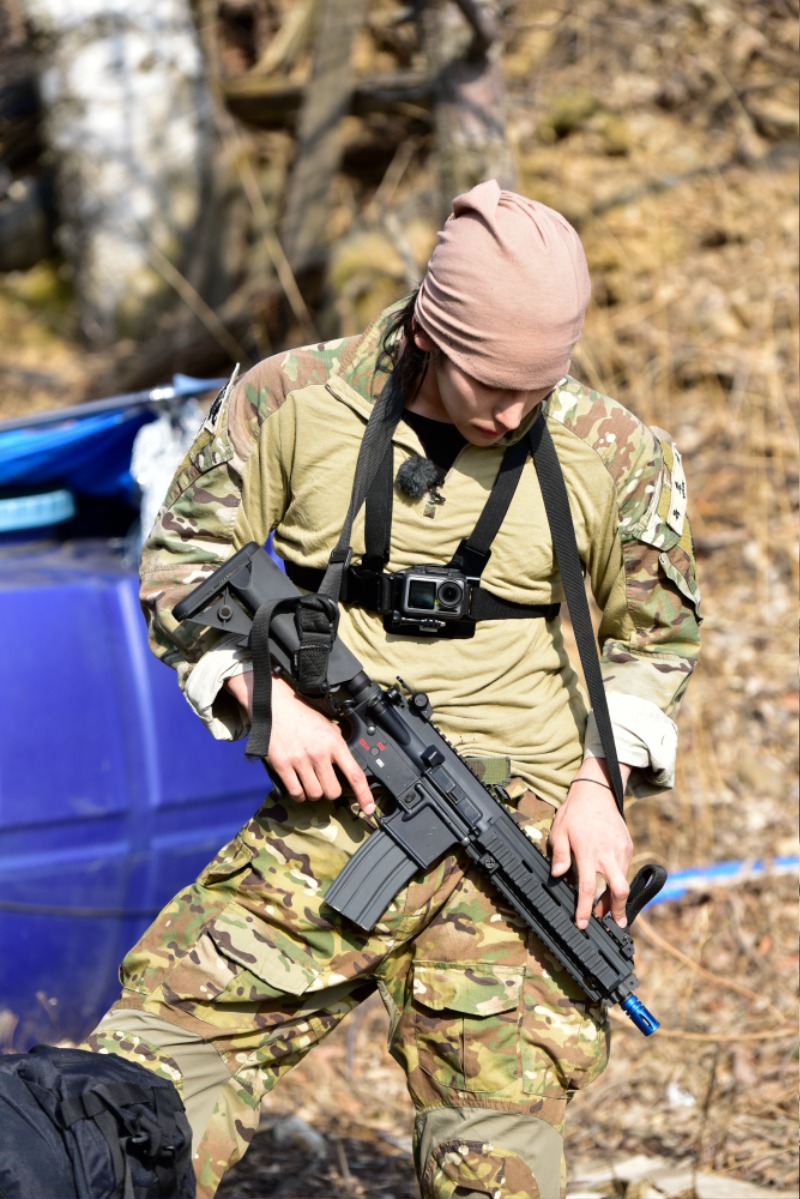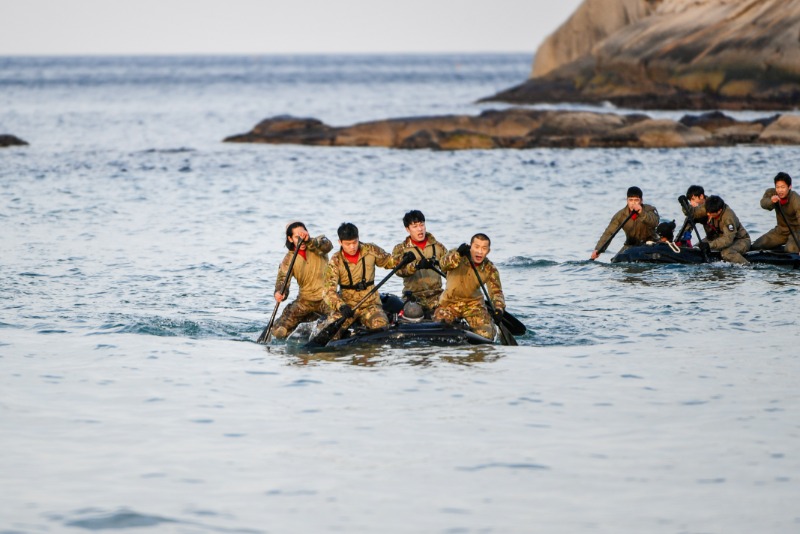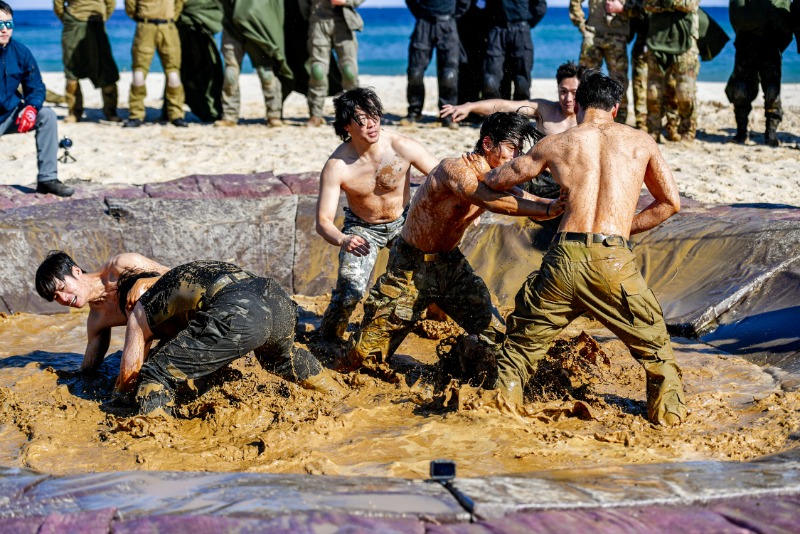Reality entertainment programs are coalescing toa sharper format that focuses on boot-camp training and survival skills. With heavily-armed North Korea just across the DMZ, the public’s interest in military content may be only natural.
Military backdrops have consistently paid off in the Korean entertainment industry. Initially a part of variety shows, they have jumped formats, with boot-camp training appearing on reality TV and in social media programs. Paralleling the trend are military branches producing videos themselves, an attempt to soften their image and widen access.
Lately, the military theme has oscillated. “Fake Men” was a smash hit on YouTube last year, amassing 50 million views, but it plummeted in its second season amid accusations that the military training endured by its celebrity contestants was sadistic. Sex scandals involving the cast members delivered another blow and resulted in malicious comments. “Fake Men” couldn’t withstand the negativity and was not renewed, raising doubts about the future viability of survival programming with a military flavor.

“Steel Troops,” which aired on cable TV Channel A from March to June this year, featured reservists from special forces units competing in situations that tested specific skills to decide the superior unit. © Channel A
Viability Doubted
That second-guessing soon ended with Channel A’s “Steel Troops.” It resuscitated the training drama format, albeit with less rawness and no civilians.
The weekly show premiered on March 23 this year for a three-month run. It involved teams of Special Forces reservists tackling challenges that tested their mettle and resolve. This included plunging into cold seawaters at night in a simulated rescue; moving a 250 kilogram tire 300 meters by flipping it over hundreds of times; and hiking 10 kilometers in mountainous terrain while strapped with 40 kilograms of gear. But with its competitors already in superb condition, there was little possibility of the show being called too demanding.
Watching the participants engage in a “Counterterrorism Operation” and “Operation to Retake the Vessel Seoul” d a game-like experience. Viewers were excited by the adrenaline-pumping scenes that seemed right out of FPS (first-person shooter) games like Rainbow Six or Battlegrounds.
The whole point was not to win best-unit bragging rights but to complete the missions. Even the teams that fell behind with no chance of winning still completed their missions out of respect to their division, making it easy to root for them. Of course, the eye-candy element of the show didn’t hurt ratings; the competitors were handsome and could strut their excellent physique. Overall, the viewership of “Steel Troops” exceeded expectations, particularly in its record 3.8 percent viewer rate among men and women aged between 20 and 49.
The Lineage

Reservists with the best physiques became viewers’ favorites. Yuk Jun-seo, who retired as staff sergeant after serving in the Explosive Ordinance Disposal of UDT/SEAL, was one of the most popular competitors. His team won the final mission. © Channel A
Early TV programming with a military theme often reached for laughs. From 1988 to 1991, the KBS 2TV show “Humor No. 1” featured a segment called “Stop Moving,” which teased the unapologetic trappings of the military. Mandatory military service in Korea elicits mixed emotions. On one hand, there are memories of grueling training and interruptions to education and careers. On the other hand, there is self-satisfaction and perhaps even bragging rights about personal accomplishments. “Stop Moving” touched the sweet spot, straddling unpleasant memories and personal pride while also poking fun at the rigid military hierarchy.
“Stage of Friendship,” a typical foxhole show broadcast on MBC from 1989 to 1997, was especially popular among men in uniform. It led to similar programs like “Youth! Reporting,” which aired on KBS 1TV from 2003 to 2007. Compared to now, the military environment at the time was much more segregated. There was practically no contact with civilians during tours of duty. The finale – and highlight – of each episode was “Dear Mother,” a tear-jerking segment where a serviceman would meet his mother who came for a brief reunion.
MBC was allowed to bend the rules slightly with “Real Men” (2013-2016). Its cameras followed celebrities placed in military units for a short period to undergo daily routines in the barracks. The program picked up on the TV trend of reality entertainment. Although some scenarios were staged for security reasons, the show, as a whole, reflected the fact that the Korean military was slowly becoming less opaque and more relaxed than it had been in the past.
As for programming d by servicemen, in 2013, the ROK Air Force made “Les Militaribles,” a promotional video that parodied “Les Misérables.” When Russell Crowe, who played Inspector Javert in the 2012 film version, retweeted the video to his followers, it became a worldwide sensation, prompting coverage by BBC News. In amicable competition, the ROK Army put up its own video, “Gentle Soldier,” a parody of “Gentleman” by the Korean singer PSY, who had gained international fame with his megahit song “Gangnam Style.” These videos showed the Korean military trying to shed its past negative image and become more approachable.

In the third and fourth episodes, the reservists simulated a clandestine infiltration by sea. They had to grapple with watercraft that weighed 250 kilograms. © Channel A
Merging Trends
“Fake Men” was a parody of “Real Men.” With the motto of “the noble challenge of fakes to become real men,” it spearheaded the merging trends of reality shows as tests of survival and field training.
YouTube channels typically feature the content of one unified creator, but “Fake Men” was an aggregation of many popular YouTubers. Some of the Special Forces drill instructors on “Fake Men” became well-known through TV shows and YouTube videos. They were compared to Bear Grylls, who served in the UK’s Territorial Army before becoming the presenter of “Man vs. Wild,” a survival program that aired on the Discovery Channel from 2006 to 2011.
Through “Fake Men,” ordinary people were subjected to grueling training designed by elite military units. Because the YouTube platform is relatively liberal in , the harsh training was unfiltered. When scenes began to exceed viewers’ tolerance level, the uproar that pulled the plug on the show erupted.
“Fake Men” wasn’t the only program that tapped into the successful combination of survival techniques and military-style conditioning. In 2020, a former non-commissioned female officer of the 707th Special Mission Battalion was the instructor on “I’m a Survivor,” a YouTube program in which female celebrities learned survival skills.
With a heavily-armed foe on its doorstep, the South Korean military has always kept a tight lid on how it operates. That includes confidentiality regarding training techniques. Access to information is limited despite the country’s political transition from military regimes to elected civilian governments.
However, the generals at the top are retiring and the military is slowly changing under the influence of younger generations. The evolution of military content enjoyed by TV and social media viewers is actually aligned with the evolution of the military itself. Formerly isolated and closed off, the military is now taking measured steps to reveal certain aspects of itself, and the military experience is being consumed through TV programs as a source of entertainment and survival know-how for everyday viewers.
The evolution of military content enjoyed by TV and social media viewers is actually aligned with the evolution of the military itself.

In its second episode, “Steel Troops” had a muddy face-off for a chance to choose the format of the tournament. Mini-missions offering team benefits served as preludes to stages in the main mission. © Channel A
Jung Duk-hyun Popular Culture Critic